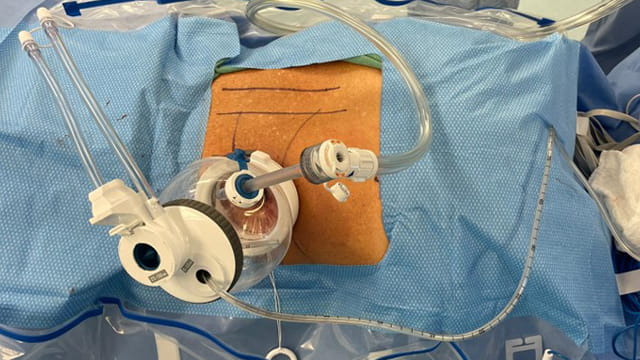Robotic Surgery Expert Invents a Better Way to Remove an Adrenal Mass
Jan. 15, 2024 - Eden McCleskeyA year after performing the world's first documented single-port, robot-assisted retroperitoneal adrenalectomy at Houston Methodist, surgical oncologist and robotic surgery expert Dr. Helmi Khadra is bringing the groundbreaking procedure to additional patients at the hospital.
The novel procedure is garnering attention for its promise of fewer incisions, faster recovery and reduced postoperative pain.
The small but crucial adrenal glands reside atop our kidneys, acting as a conductor for a complex symphony of hormones that regulate blood pressure, gender characteristics, adrenaline, stress and more.
When a mass appears in this region, the first step is to find out if it is cancerous or benign, then assess the symptoms it is causing. Malignant masses are almost always removed via open surgical procedures, and hormonally active benign masses causing issues are usually removed through some form of minimally invasive surgery, either through the abdomen or through the back.
"There's sort of a hierarchy of procedures, and which centers perform them is based on how high volume they are," Dr. Khadra explained. "Most people do laparoscopic surgery through the abdomen, some higher-volume places do laparoscopic surgery through the back, and only a handful of very high-volume centers do robotic surgery through the back."
When he was hired in 2021, Dr. Khadra brought a wealth of experience and expertise in robotic surgery to Houston Methodist, quickly becoming one of the highest volume robotic adrenal surgeons in the nation.
"You are considered high-volume if you perform six of these a year," Dr. Khadra explained. "Since I've been at Houston Methodist, I've performed over 100 adrenalectomies — the majority of them robotically through the back. Because I do so many of these, I'm always looking for better, easier ways that have benefits for the patient as well. When I was introduced to the new Da Vinci SP robot, I immediately knew that the retroperitoneal approach would be ideal."
Because the adrenal glands are closer to the back than the front, a retroperitoneal approach streamlines the procedure, making it a quicker operation with fewer critical organs to navigate around and resulting in an easier recovery for patients. However, it poses a unique challenge to surgeons, requiring a mental adjustment from the standard approach through the abdomen.
"Robotic retroperitoneal surgery is acknowledged as the least invasive and most direct approach; however, it is not as common because of the extensive training required," Dr. Khadra said.
Dr. Khadra's prior training and experience in robotic adrenals and his access to the new Da Vinci SP robot set the stage for the creation of the most minimally invasive version of the procedure yet.
He performed the first single-port retroperitoneal adrenalectomy in November 2022, successfully removing the adrenal gland and tumor with only one tiny incision. The patient, a female in her 60s with an adrenaline-producing tumor causing dangerous spikes in her blood pressure, experienced significantly less pain and a swift recovery.
Since then, Dr. Khadra has successfully performed several more procedures using the same approach, marking a potential paradigm shift in the field of adrenalectomies.
"We have seen a lot of interest from patients, but our current eligibility criteria limit it to certain patients," Dr. Khadra explained. "Anytime you try a new surgical approach, you want to start with the simplest cases first and then work your way up to more complex anatomy."
Meanwhile, Dr. Khadra is carefully tracking outcomes for this novel procedure, anticipating that it will noticeably reduce postoperative pain and accelerate recovery while maintaining excellent outcomes.


